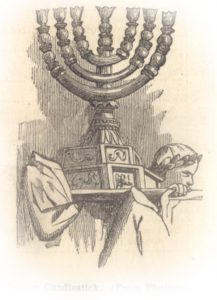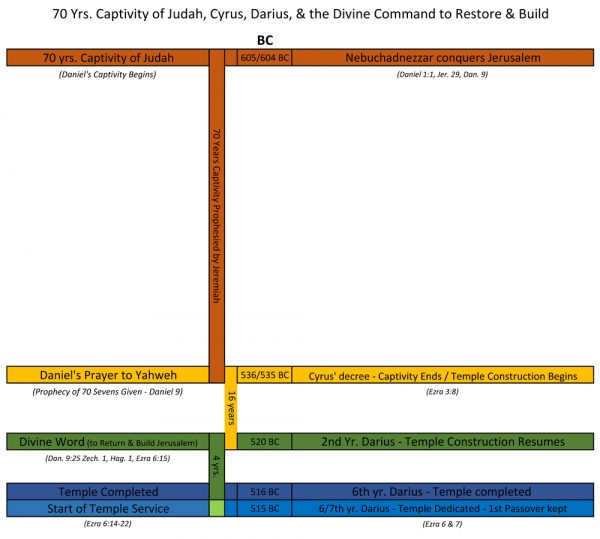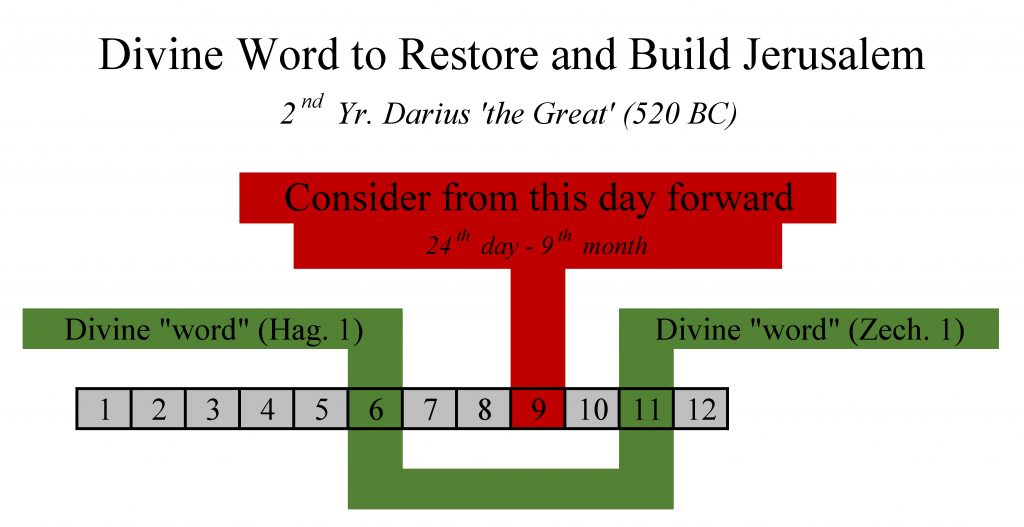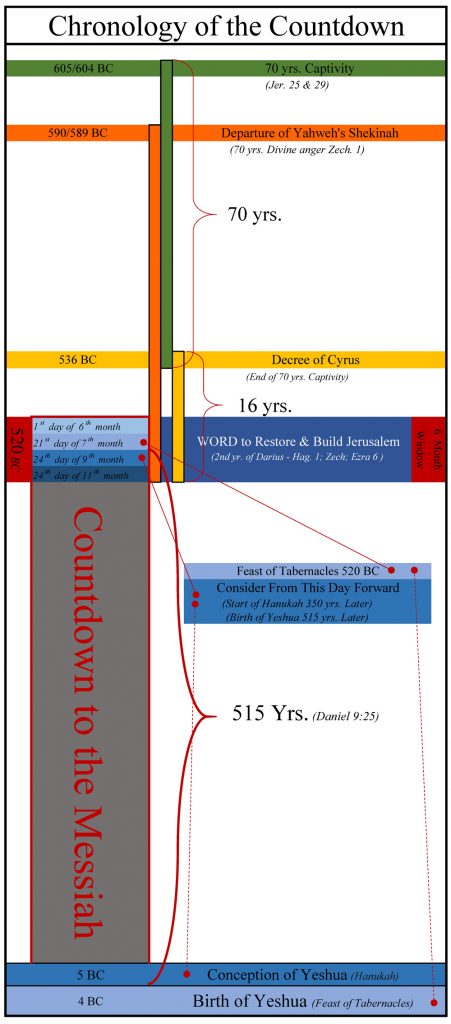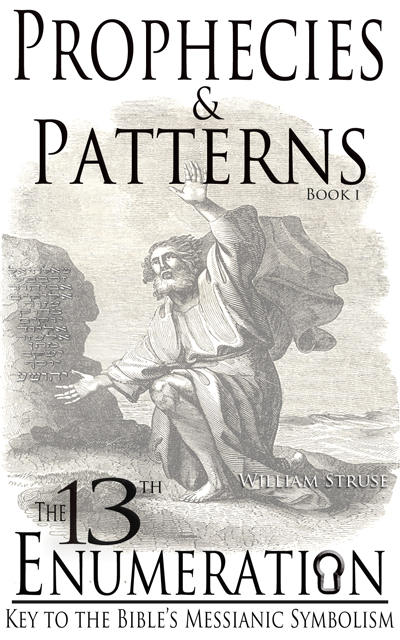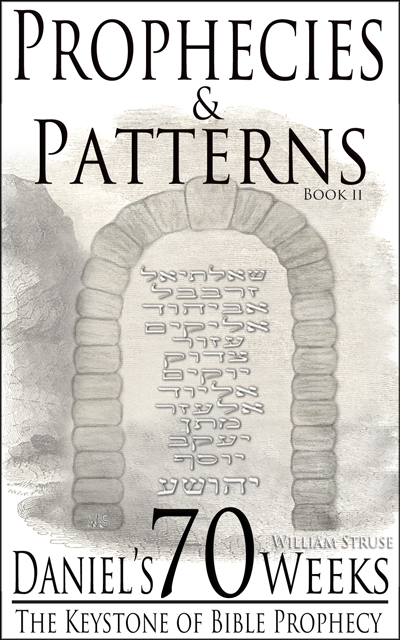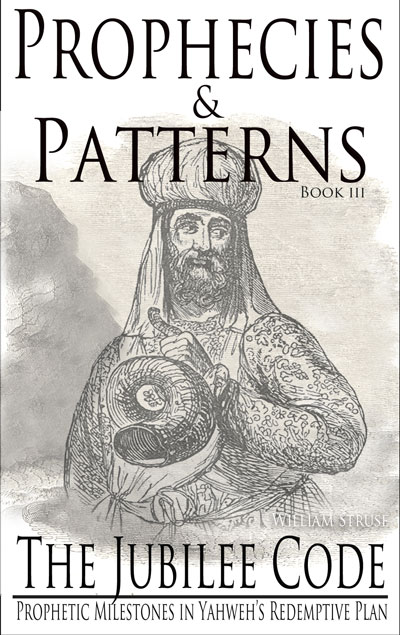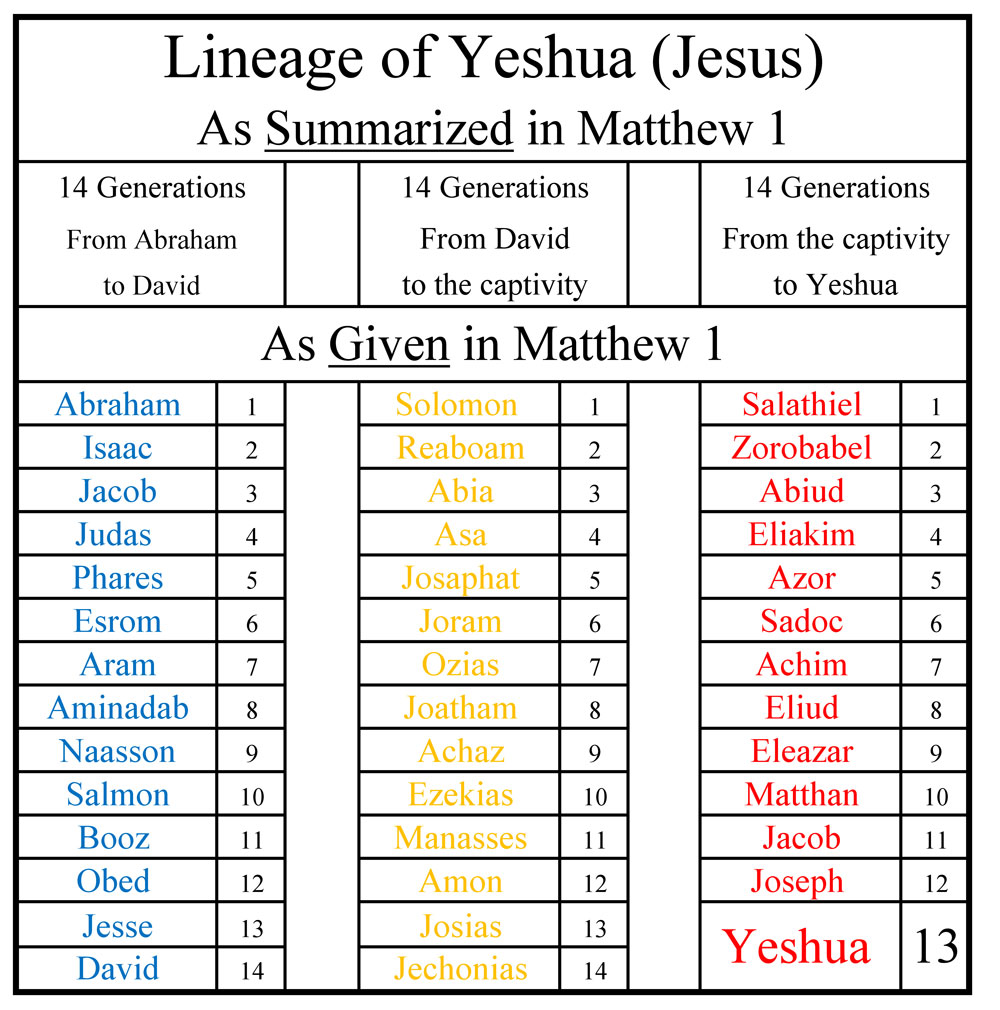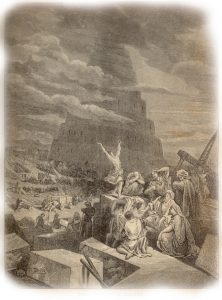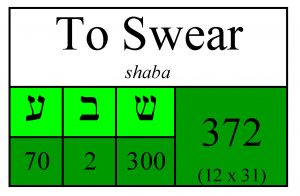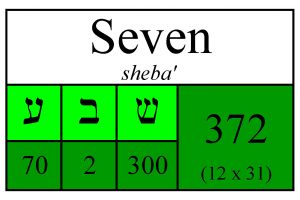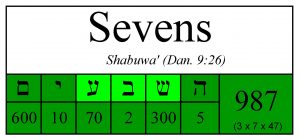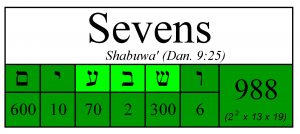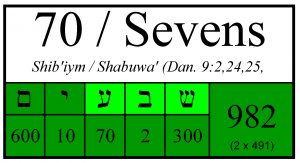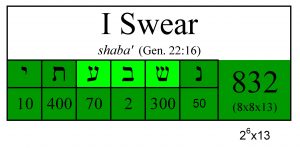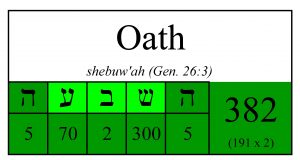PART II: I Am the Light of the Word
This week as we continue looking at the back-story of the Messiah’s birth, I hope to show you the thrilling origins of the apostle Peter’s statement (above), origins found in a promise made to the Jewish people by Yahweh, the living God of the Bible, in the 2nd year of Darius ‘the great’ Artaxerxes. Intriguingly, we’ll find in Peter’s statement a connection to Daniel 9, Hanukkah, the glory of Yahweh, and the birth of Yeshua (Jesus), the Bible’s promised Messiah.
I Have Sworn – An Oath of Sevens
Part I of this series (here) looked at Yahweh’s Oath of Sevens with Abraham, also know in the Old and New Testaments as the “Covenant and Mercy” of Yahweh. This Oath of Sevens we learned was an ancient promise concerning (in part) the promised messianic “seed” through whom all nations of the earth would be blessed. We followed this Covenant and Mercy to Daniel’s opening words in Chapter 9 of the book that bears his name where we saw that Daniel’s prayer for Yahweh’s “covenant and mercy” (a.k.a Yahweh’s Oath of Sevens) was answered with prophecy of 70 Sevens, telling Daniel, the Jewish people, and indeed all mankind when that promised messianic hero would come.
So let’s briefly return to Daniel’s wonderful prophecy in order to further fill in the context and texture of the Bible’s most important prophetic utterance, the only prophetic utterance in the Bible, I remind you, that specifically tells mankind when that Messianic redeemer would come.
Thy Holy Mountain
We return now to look at Daniel 9 and Daniel’s impassioned prayer. As we’ve seen, Daniel opened his prayer with a plea for Yahweh to remember His “Covenant and Mercy” which as we now know was a call for the coming of the Messiah. Daniel goes on to plea with YHWH to restore Jerusalem, the holy city and Yahweh’s desolate sanctuary, that one place where Yahweh choose to meet with mankind and where Daniel’s people (the Jewish people) had the special distinction of serving the living God of the Bible.
I believe far too often most scholars and commentators separate the context of Daniel’s prayer to Yahweh in Daniel 9:4-19 from the prophecy of 70 Sevens. For some strange reason they don’t allow the context of Daniel’s prayer to inform their interpretation of the prophecy.
I encourage you to read Daniel 9:4-19 carefully. Daniel’s view of the restoration of Jerusalem was insuperably linked to the restoration of Yahweh’s desolate sanctuary. This restoration of Yahweh’s house was further linked to the coming of the Messiah by Daniel’s plea for Yahweh to remember His “Covenant and Mercy”. It makes no difference whether Abraham, Daniel, Zachariah, Peter, or even Mary fully understood the implications of Yahweh’s covenant and mercy (as discussed in Part I of this series). Nevertheless, in retrospect, we are all privileged to see the context and implications of those wonderful words. As the apostles and other early believers learned, Yahweh’s covenant and mercy was first and foremost a promise of the restoration of Israel’s spiritual fortunes, after which Yahweh in His mercy gave a special dispensation (times of the gentiles) to the nations so they too could be added to the family of God, and finally, at some point in the future, Israel’s physical/political restoration will take place with Yeshua’s return and rule from the throne of David in Jerusalem.
The Commandment to Restore and Build Jerusalem
So when Daniel 9:25 tells us that the 70 Sevens countdown to the Messiah begins with a “commandment” (Hebrew = dabar = word) to restore and build Jerusalem; we must look for this word with our understanding informed by Daniel’s original prayer for the coming of the Messiah and the restoration of YHWH’s desolate sanctuary. (The de facto event in the restoration of Jerusalem.) To refresh your recollections, the 70 Sevens prophetic countdown to the Messiah begins with these words:
Know therefore and understand, that from the going forth of the commandment [dabar = word] to restore [shuwb = return] and to build Jerusalem unto the Messiah the Prince shall be seven weeks,… (Daniel 9:25)
Babylon Is Fallen!
Remember the context here, Daniel’s prayer and Yahweh’s subsequent prophetic answer originated at the tail end of the Jewish people’s 70 year exile in Babylon. The Babylon of Nebuchadnezzar and his descendants had just fallen to Cyrus of Persia and Daniel understood that the 70 years of exile was nearly over. The following verses provide a succinct summary:
In the first year of Darius the son of Ahasuerus, of the seed of the Medes, which was made king over the realm of the Chaldeans; In the first year of his reign I Daniel understood by books the number of the years, whereof the word of YHWH came to Jeremiah the prophet, that he would accomplish 70 years in the desolations of Jerusalem. (Daniel 9:1-2)
And this whole land shall be a desolation, and an astonishment; and these nations shall serve the king of Babylon 70 years. And it shall come to pass, when 70 years are accomplished, that I will punish the king of Babylon, and that nation, saith YHWH, for their iniquity, and the land of the Chaldeans, and will make it perpetual desolations. (Jeremiah 25:11-12)
That confirmeth the word of his servant, and performeth the counsel of his messengers; that saith to Jerusalem, Thou shalt be inhabited; and to the cities of Judah, Ye shall be built, and I will raise up the decayed places thereof: That saith to the deep, Be dry, and I will dry up thy rivers: That saith of Cyrus, He is my shepherd, and shall perform all my pleasure: even saying to Jerusalem, Thou shalt be built; and to the temple, Thy foundation shall be laid. (Isaiah 44:26-28)
So now Daniel, after his opening plea for Yahweh’s “covenant and mercy” also pleads for the restoration of Jerusalem and Yahweh’s desolate sanctuary, pleadings that are themselves but reminders of Yahweh’s promises given through “his messengers” that Jerusalem and the temple would be restored.
Cyrus and the Temple Foundation
Today, there are many respected commentators on Daniel 9 who still believe that somehow it was the decree by Cyrus (which allowed the Jewish people to return and build Jerusalem and the temple) mentioned above and in 2 Chron. 36 & Ezra 1 that was the “commandment to restore and build Jerusalem” prophesied by Daniel 9:25.
Now in the first year of Cyrus king of Persia, that the word of YHWH spoken by the mouth of Jeremiah might be accomplished, YHWH stirred up the spirit of Cyrus king of Persia, that he made a proclamation throughout all his kingdom, and put it also in writing, saying, Thus saith Cyrus king of Persia, All the kingdoms of the earth hath YHWH God of heaven given me; and he hath charged me to build him an house in Jerusalem, which is in Judah. Who is there among you of all his people? YHWH his God be with him, and let him go up. (2 Chronicles 36:22)
Indeed, as it is recorded in 2 Chronicles 36:22 (above) and repeated in Ezra 1:1, Cyrus himself claims that Yahweh charged him to “build the house of Yahweh God of Israel”. To be fair to those who see this as the “commandment to restore and build Jerusalem”, the context of Daniel’s prayer to Yahweh is in fact focused towards the restoration of Jerusalem which he (Daniel) understood as centered on the restoration of Yahweh’s “sanctuary that is desolate”. There is no way to escape the context here. Daniel’s view of Jerusalem’s “restoration” centered on Yahweh’s house and the return of His presence to that house.
The Prophecy of Isaiah Versus the boasting of Cyrus
Even though Cyrus personally boasted that Yahweh had charged him to “build him a house at Jerusalem” it is clear from the prophet Isaiah (below) that Cyrus’ contribution to building Yahweh’s house was to be limited to the restoration of the temple’s foundation. Here take a look again:
That confirmeth the word of his servant, and performeth the counsel of his messengers; that saith to Jerusalem, Thou shalt be inhabited; and to the cities of Judah, Ye shall be built, and I will raise up the decayed places thereof: That saith to the deep, Be dry, and I will dry up thy rivers: That saith of Cyrus, He is my shepherd, and shall perform all my pleasure: even saying to Jerusalem, Thou shalt be built; and to the temple, Thy foundation shall be laid. (Isaiah 44:26-28)
A careful reading of the book of Ezra confirms that in fact the prophecy of Isaiah as given by Yahweh concerning Cyrus was amazingly accurate. Cyrus’ decree allowing the Jewish people to return and build Jerusalem and the temple only resulted in the start of efforts to lay the temple’s foundation. The Jewish people left off building the temple and instead started working on their own houses. It would be 16 more years and another very special “commandment” to return and build Jerusalem before the temple construction would resume and the temple itself be restored. The following chart reflects the chronology discussed:
But after that our fathers had provoked the God of heaven unto wrath, he gave them into the hand of Nebuchadnezzar the king of Babylon, the Chaldean, who destroyed this house, and carried the people away into Babylon. But in the first year of Cyrus the king of Babylon the same king Cyrus made a decree to build this house of God. Ezra 5:12-13
Now in the second year [2nd yr. of Cyrus as king of Babylon] of their coming unto the house of God at Jerusalem, in the second month, began Zerubbabel the son of Shealtiel, and Jeshua the son of Jozadak, and the remnant of their brethren the priests and the Levites, and all they that were come out of the captivity unto Jerusalem; and appointed the Levites, from twenty years old and upward, to set forward the work of the house of YHWH. (Ezra 3:8)
Think about that, it was 16 years after Cyrus’ initial decree and Yahweh’s house was no closer to completion – nearly a decade and a half and only some of the foundation had been laid! If Daniel was still alive at this time can you image his sorrow at the fact that Yahweh had allowed his brethren to return yet they had not been motivated enough to lay more than a few foundation stones of Yahweh’s desolate sanctuary.
As we will see, there was reason for this delay. In Yahweh’s divine redemptive plan it was not yet time for His countdown to the Messiah to begin. In fact, according to the book of Zechariah 1 those sixteen years from the decree of Cyrus were the final years of a 70 year period of Yahweh’s divine indignation against the Jewish people. The following verses explain:
Upon the four and twentieth day of the eleventh month, which is the month Sebat, in the second year of Darius [520 BC], came the word of YHWH unto Zechariah, the son of Berechiah, the son of Iddo the prophet, saying…
Then the angel of YHWH answered and said, O YHWH of hosts, how long wilt thou not have mercy on Jerusalem and on the cities of Judah, against which thou hast had indignation these threescore and ten years? And YHWH answered the angel that talked with me with good words and comfortable words. So the angel that communed with me said unto me, Cry thou, saying, Thus saith YHWH of hosts; I am jealous for Jerusalem and for Zion with a great jealousy.
… Therefore thus saith YHWH; I am returned to Jerusalem with mercies: my house shall be built in it, saith YHWH of hosts, and a line shall be stretched forth upon Jerusalem. (Zechariah 1:7-16 excerpted)
A “Commandment”, Decree, Proclamation, or Word?
I hope you’ll stick with me here, because we are working towards the goal of understanding the context surrounding the “commandment” to restore and build as described in the prophecy of Daniel 9. This “commandment” in turn provides us with the foundation upon which to build our understanding of Daniel 9:25 and the countdown to the Messiah as it relates to the celebration of Hanakkuh, Christmas and the birth of the Messiah. Once again Daniel 9:25a provides us with that amazing prophetic countdown:
Know therefore and understand, that from the going forth of the commandment [Hebrew dabar = word] to restore and to build Jerusalem unto the Messiah the Prince shall be seven weeks,… (Daniel 9:25)
Did you know that the word “commandment” as used here in Daniel 9 is the Hebrew word dabar? Dabar interestingly in its plainest sense simply means ‘speech’ or ‘word’. In fact, according to my concordance dabar is used 1439 times in the Old Testament and of those occurrences the vast majority refers to the “word” of Yahweh.
Daniel 9, in fact, confirms this rule. Dabar is found four times in Daniel 9, including the occurrence of Daniel 9:25. Of those, the first three occurrences unambiguously describe the dabar or word of Yahweh, the living God of the Bible. Take a moment to see for yourself:
In the first year of his reign I Daniel understood by books the number of the years, whereof the word [dabar] of YHWH came to Jeremiah the prophet, that he would accomplish seventy years in the desolations of Jerusalem. (Daniel 9:2)
And he hath confirmed his words [dabar], which he spake against us, and against our judges that judged us, by bringing upon us a great evil: for under the whole heaven hath not been done as hath been done upon Jerusalem. (Daniel 9:12)
At the beginning of thy supplications the commandment [dabar] came forth, and I am come to shew thee; for thou art greatly beloved: therefore understand the matter, and consider the vision. (Daniel 9:23)
Know therefore and understand, that from the going forth of the commandment [Hebrew dabar = word] to restore and to build Jerusalem unto the Messiah the Prince shall be seven weeks,… (Daniel 9:25)
Astounding, isn’t it? Can you explain to me why, given that dabar is used three other times in Daniel 9 to refer to the literal words of Yahweh, the living God of the Bible, scarcely a single writer today, when commenting on the “commandment” of Daniel 9:25 acknowledges this most important context?
Compounding this egregious oversight is the fact that Ezra, Haggai, and Zechariah all testify that there was indeed a Divine word (dabar) to restore and build Jerusalem. We’ll get to this Divine word in a moment but for thoroughness sake let’s first take a quick look at four of the most often cited decrees that commentators today use to claim the fulfillment of the “commandment” (word) of Daniel 9:25. In chronological order those so called “commandments” are as follows:
- The “proclamation” (Hebrew abar) of Cyrus which allowed the Jewish people to build Jerusalem and the Temple. (2 Chron. 36:22, Ezra 1:1) Ezra 4:3 describes this proclamation by Cyrus as a command (Hebrew tsavah) Ezra 5:13, 17, 6:3 & 14 describes this original proclamation as a “decree” (Hebrew te’em). Finally Isaiah 44:28 describes these events as Cyrus “saying” (Hebrew amar)
- The undated “decree” (Hebrew te’em) given at some point during or after the 7th year of “Artaxerxes” as described in Ezra 7:13 & 21. This “decree” granted Ezra permission and resources to beautify the temple.
- The “decree” (Hebrew te’em) given in the 2nd year of Darius granting the Jewish people permission to continue building the house of YHWH (after Yahweh had already commandment them to restart construction), further Darius granted building materials and commodities in assistance of the building efforts. (see Ezra 6:8, 11, & 13)
- The permission given in the 20th or 21st year of “Artaxerxes” allowing Nehemiah to return to Jerusalem and fortify its walls. This permission was certified in what the text describes as “letters” (Hebrew iggereth) that also seemed to include an appointment or command (Hebrew tsavah) which made Nehemiah governor of Jerusalem. (See Neh. 2 & 5) The text never describes these letters as commands or decrees nor does the text tell us when these letter or implied decrees/commands were given (it must be guessed at from the text).In the interest of thoroughness, Nehemiah 2:18 does describe “words” (Hebrew dabar) that King “Artaxerxes” spoke personally to Nehemiah, words Nehemiah shared with his brethren. The text doesn’t indicate though whether these words were related to King Artaxerxes’ letter, his implied decree or just personal words of comfort to Nehemiah. Here too the text does not provide us with a definitive date as to when these “words” were given.
In summary, it should be noted that none of these proposed proclamations, decrees, or letters clearly qualify as a “word” (Hebrew dabar) to restore and build Jerusalem described within the context of Daniel 9:4-20), and even more clearly none of these could be described as a divine word to restore and build Jerusalem. And options #2 & #3 above do not provide definitive dates upon which to calculate a starting point of Daniel 9:25.
A Divine Word to Return and Build
Here is where the congruency of the Bible really shines if you allow it to speak for itself. We’ve now established that in roughly 536 BC Cyrus gave a decree which allowed the Jewish people to return and build Jerusalem. The thrust of the initial efforts were directed towards the rebuilding of Yahweh’s desolate sanctuary. Those efforts did not get further than laying the foundation of the temple in fulfillment of Isaiah 44:26-28.
Then in the 2nd year of Darius ‘the great’ Artaxerxes (circa 520 BC), Yahweh, through the prophets Haggai and Zechariah commanded Joshua the high priest, Zerubbabel, the governor, and Jewish people to return and build His desolation sanctuary. This so called “command” was given as a the “word” (dabar) of Yahweh through these two prophets. Notice in the following passage Ezra records that there were two witnesses for this divine word to return and build Jerusalem:
And the elders of the Jews builded, and they prospered through the prophesying of Haggai the prophet and Zechariah the son of Iddo. And they builded, and finished it, according to the commandment of the God of Israel, and according to the commandment of Cyrus, and Darius, and Artaxerxes king of Persia. (Ezra 6:14)
To complete the picture, here are the two so called words (dabar) of Yahweh commanding the Jewish people to return and build Jerusalem. Remember, from the perspective of Yahweh, Daniel, and the prophets we’ve explored in this article, restoring Yahweh’s desolate sanctuary (the temple) was in fact “building Jerusalem”.
The WORD given to Haggai
In the second year of Darius the king, in the sixth month, in the first day of the month, came the word [dabar] of YHWH by Haggai the prophet unto Zerubbabel the son of Shealtiel, governor of Judah, and to Joshua the son of Josedech, the high priest, saying,…
Then came the word [dabar] of YHWH by Haggai the prophet, saying,
Is it time for you, O ye, to dwell in your cieled houses, and this house lie waste?…
Thus saith the YHWH of hosts; Consider your ways. Go up to the mountain, and bring wood, and build the house; and I will take pleasure in it, and I will be glorified, saith YHWH.
Ye looked for much, and, lo, it came to little; and when ye brought it home, I did blow upon it. Why? saith YHWH of hosts. Because of mine house that is waste, and ye run every man unto his own house.
Then Zerubbabel the son of Shealtiel, and Joshua the son of Josedech, the high priest, with all the remnant of the people, obeyed the voice of YHWH their God, and the words [dabar] of Haggai the prophet, as YHWH their God had sent him, and the people did fear before YHWH.
Then spake Haggai the YHWH’S messenger in the YHWH’s message unto the people, saying, I am with you, saith YHWH. 14 And YHWH stirred up the spirit of Zerubbabel the son of Shealtiel, governor of Judah, and the spirit of Joshua the son of Josedech, the high priest, and the spirit of all the remnant of the people; and they came and did work in the house of YHWH of hosts, their God, In the four and twentieth day of the sixth month, in the second year of Darius the king. (Haggai 1:1-15 excerpted)
The WORD given to Zechariah
Upon the four and twentieth day of the eleventh month, which is the month Sebat, in the second year of Darius, came the word [dabar] of the YHWH unto Zechariah, the son of Berechiah, the son of Iddo the prophet, saying… Then the angel of the YHWH answered and said, O YHWH of hosts, how long wilt thou not have mercy on Jerusalem and on the cities of Judah, against which thou hast had indignation these 70 years? And the YHWH answered the angel that talked with me with good words and comfortable words…
Therefore thus saith YHWH; I am returned to Jerusalem with mercies: my house shall be built in it, saith the YHWH of hosts, and a line shall be stretched forth upon Jerusalem. (Zechariah 1:7-16 excerpted)
A Window of Time
As seen from the two passages above (also confirmed by Ezra 6:14), Yahweh’s divine word to restore and build Jerusalem could be considered a window of time between the 1st day of the 6th month and the 24th day of the 11th month. I believe that this window in time, if the text provided no additional information, would be sufficient for calculating the starting point of the divine “word” of Daniel 9:25.
I believe though, there is reasonable grounds to consider a more specific starting date for Yahweh’s countdown to Yeshua (His Salvation) within this window. Following the chronology here, inside this 6 months window in time, as the prophet Haggai speaks the dabar “words” of Yahweh to Zerubbabel, the governor, and Joshua (Hebrew Yeshua), the high priest, words that are clearly Messianic in nature:
In the seventh month, in the one and twentieth day of the month, came the word of YHWH by the prophet Haggai, saying, Speak now to Zerubbabel the son of Shealtiel, governor of Judah, and to Joshua the son of Josedech, the high priest, and to the residue of the people, saying,
Who is left among you that saw this house in her first glory? and how do ye see it now? is it not in your eyes in comparison of it as nothing? Yet now be strong, O Zerubbabel, saith YHWH; and be strong, O Joshua, son of Josedech, the high priest; and be strong, all ye people of the land, saith YHWH, and work: for I am with you, saith the LORD of hosts: (Haggai 2:1-4)
Yahweh Dwells With Mankind
Notice the dates here. This Word of Yahweh came to Haggai on the 21st day of the 7th month (the final day of the Feast of Tabernacles). This word was a call to compare the glory of the 1st temple with the glory of the 2nd temple along with encouragement to stay the course.
(Remember this is just one month after Yahweh gave His divine commanded to the Jewish people to return and build the temple and in the middle of Yahweh’s window of time between His divine word to restore and build.)
Then Yahweh further explains to Haggai that “in a little while” He will shake the heavens, the earth, and the nations, and this will result in that the “desire of all nations will come: and I will fill this house with glory saith YHWH of hosts.”
Keep in mind the amazingly congruent context here. Exactly 480 years earlier Solomon completed the temple and dedicated it during the Feast of Tabernacles. Here Yahweh is calling Joshua, the high priest, Zerubbabel, the governor, and the people to remember the former glory of Solomon’s temple, reminding them that that “glory” (Yahweh’s presence) came down out of heaven and consumed the sacrifices and filled the newly built 1st temple during the Feast of Tabernacles (Yahweh’s divine appointment – mow’ed)
Now Yahweh is saying, be encouraged Joshua and the people because the glory of this 2nd temple will be greater than the glory of the former. As you read these two passages think about the implications of this statement and how such a wonderful future even might be possible?
For thus saith YHWH of hosts; Yet once, it is a little while, and I will shake the heavens, and the earth, and the sea, and the dry land; And I will shake all nations, and the desire of all nations shall come: and I will fill this house with glory, saith YHWH of hosts. The silver is mine, and the gold is mine, saith YHWH of hosts. The glory of this latter house shall be greater than of the former, saith YHWH of hosts: and in this place will I give peace, saith YHWH of hosts. (Haggai 2:6-9)
Thus all the work that Solomon made for the house of YHWH was finished: and Solomon brought in all the things that David his father had dedicated; and the silver, and the gold, and all the instruments, put he among the treasures of the house of God. Then Solomon assembled the elders of Israel, and all the heads of the tribes, the chief of the fathers of the children of Israel, unto Jerusalem, to bring up the ark of the covenant of YHWH out of the city of David, which is Zion. Wherefore all the men of Israel assembled themselves unto the king in the feast which was in the seventh month…
Then said Solomon, YHWH hath said that he would dwell in the thick darkness. But I have built an house of habitation for thee, and a place for thy dwelling for ever….
Now when Solomon had made an end of praying, the fire came down from heaven, and consumed the burnt offering and the sacrifices; and the glory of YHWH filled the house. And the priests could not enter into the house of YHWH, because the glory of YHWH had filled the YHWH’S house…
Also at the same time Solomon kept the feast seven days, and all Israel with him, a very great congregation, from the entering in of Hamath unto the river of Egypt. And in the eighth day they made a solemn assembly: for they kept the dedication of the altar seven days, and the feast seven days. (2 Chronicles 5:1-3; 6:1-2; 7:1-9 excerpted)
Let me emphasize that it was during the Feast of Tabernacles that Yahweh’s presence filled the 1st temple. 480 years later it was on the 7th day of Feast of Tabernacles that Yahweh promised Joshua, Zerubbabel, and the people that he would someday again fill His house with a greater glory and that He would bring peace. Does this sound like another prophecy you might have heard? Who but the Prince of Peace could fulfill such a prophecy?
For unto us a child is born, unto us a son is given: and the government shall be upon his shoulder: and his name shall be called Wonderful, Counsellor, The mighty God, The everlasting Father, The Prince of Peace. Of the increase of his government and peace there shall be no end, upon the throne of David, and upon his kingdom, to order it, and to establish it with judgment and with justice from henceforth even for ever. The zeal of YHWH of hosts will perform this. (Isaiah 9:6-7)
Let the astounding implications of this set for a moment as we rejoin Joshua and Zerubbabel two months later (still inside our 6 months window of time) at another auspicious date. Don’t worry we will revisit these wonderful prophecies and show how amazingly congruent and connected they are.
Consider From This Day Forward I Will Bless You
Today, many claim that Hanukkah (the Jewish Festival of Lights / Dedication) is nowhere mentioned in the Old Testament. While this may be true in letter, an argument can be made that it is mentioned in spirit. I’ll let you decide as you consider the word (dabar) of Yahweh to Haggai just two months after His amazing prophecy concerning the coming glory of His house.
Then answered Haggai, and said, So is this people, and so is this nation before me, saith YHWH; and so is every work of their hands; and that which they offer there is unclean. 15 And now, I pray you, consider from this day and upward, from before a stone was laid upon a stone in the temple of YHWH: …
Consider now from this day and upward, from the four and twentieth day of the ninth month, even from the day that the foundation of YHWH’S temple was laid, consider it. Is the seed yet in the barn? yea, as yet the vine, and the fig tree, and the pomegranate, and the olive tree, hath not brought forth: from this day will I bless you. (Haggai 2:14-19 excerpted)
As you can see from this passage the temple foundation was completed on the 24th day of the 9th month. I remind you of the context here as described by the book of Ezra. Joshua’s and Zerubabbel’s efforts to rebuild the temple were beset on every side by difficulties and resistance. It had been 15 years and the people’s heart had not been in the effort. They were surrounded by enemies who continually tried to resist their efforts to rebuild the temple. When this prophecy was given to Haggai the temple was still four years away from completion, yet here is Yahweh promising them to consider or count from this day forward because He promised to bless them.
Counting from the 24th day of the 9th month, the first day of blessing fell on the 25th day of the 9th month. This day nearly 350 years in the future would be celebrated by the cleansing and rededication of the temple by Judas Maccabaeus, a blessing indeed.
It was claimed by the Maccabaeus that after the cleansing of the temple there was only one day of oil for the 7 branched menorah which lighted the outdoor area around the temple, but miraculously the oil lasted for 8 days. Because of this miracle, with time, the celebration of Hanukkah (dedication) became also known as the Festival of Lights. This great event in Jewish history was celebrated in the time of Yeshua, and continues to be celebrated to this day. In fact, it was during this “feast of dedication” that Yeshua stood up in the temple and said “I am the Light of the World”.
I must work the works of him that sent me, while it is day: the night cometh, when no man can work. As long as I am in the world, I am the light of the world. When he had thus spoken, he spat on the ground, and made clay of the spittle, and he anointed the eyes of the blind man with the clay,…
Others said, These are not the words of him that hath a devil. Can a devil open the eyes of the blind? And it was at Jerusalem the feast of the dedication, and it was winter. And Jesus walked in the temple in Solomon’s porch. (John 9:5 – 10:23 excerpted)
Sent Him to Bless You
As enlightening as this history has been, (excuse the pun) the real blessing of counting this day forward is found in prophecy of Daniel 9. I remind you the countdown to the Messiah found in Daniel 9:25 begins with the following words:
Know therefore and understand, that from the going forth of the commandment [Hebrew dabar = word] to restore and to build Jerusalem unto the Messiah the Prince shall be seven weeks,… (Daniel 9:25)
The (word=dabar) to restore and build Jerusalem was given through the prophets Haggai and Zechariah in the 2nd year of Darius ‘the great’ Artaxerxes. These divine words bookended a roughly 6 months window of time inside of which Yahweh told the Jewish people to remember the coming of the glory of Yahweh into the 1st temple during the Feast of Tabernacles, and a yet coming greater glory. Two months later Yahweh again spoke to the Jewish people through Haggai and told them to count from the 24th day of the 9th month because He was going to Bless them.
So let’s consider or count Daniel 9:25 forward from the 24th day of the 9th month. Our first day of the count then begins on the 25th day of the 9th month in the 2nd year of Darius ‘the great’ Artaxerxes. That date falls in winter of 520 BC.
Seven Weeks
To this day it The history we explored in the pages above showed us that Yahweh’s divine “commandment” still surprises me how most scholars ignore the plain statement of Daniel 9:25, which tells us the Messiah would come “seven weeks” after the “word” to restore and build. The Hebrew language is quite fascinating, and the usage of Hebrew in the Bible even more so.
As I’ve explained in the first part of this article and more fully in my recent article Seven, 70, & Sevens: Daniel 9 & the Bible’s Messianic Symbolism, the number 7, Sevens, and 70 have great significance related to the Bible’s Messianic symbolism. Here in Daniel 9:25 the Hebrew words translated “seven weeks” (In Yellow below) by English scholars look like this in Hebrew:
As I’ve explained in my articles and books, when Daniel was given the prophecy there were no cantilation marks (vowel pointings) in Hebrew. They were added by the Mesoretes during the Middle Ages to provide the reader with their understanding of the Hebrew words. The cantilation marks are not inspired. Let that sink in a moment!
To be sure the Mesoretes did their best to interpret the Hebrew text in keeping with what they believed to be the most contextually accurate meaning of the words. But they didn’t necessary get it correct every time.
Look at Daniel 9:25 again. Based upon the Mesoretes’ vowel pointings, the King James version of the Bible translates the passage as “seven weeks”. Translated literally as the text was given to Daniel, the passage might be more accurately read Seven 70. This would mean then that Daniel 9:25 read literally as given would be:
Know therefore and understand, that from the going forth of the commandment [Hebrew dabar = word] to restore and to build Jerusalem unto the Messiah the Prince shall be seven weeks 7 Seventy ,… (Daniel 9:25)
As many scholars have noted through the centuries, Daniel 9 does not specifically state what measure of time is to be used when calculating the Seven 70. Yahweh could have easily said it would 490 Years to the coming of the Messiah.
That He did not say this should give all of us pause. In fact, it should make us carefully consider that something special is going on here. As regular readers of this blog know, I believe the “time” aspect of Daniel 9 seems a mystery to most of us because we are not familiar with how the Bible reckons time nor are we familiar with how that reckoning of time is related to the Bible’s messianic symbolism.
In short, the Bible’s calendar is lunar/solar. It is not based upon a strictly solar year nor is it based upon a strictly lunar year it is a hybrid between the two. In practical terms this means that the Bible’s year varies between 12 or 13 months. This means that the Bible’s calendar is a certain number of lunar cycles, and said cycles are then intercalated (synchronized) with the solar year. (For more on this subject please see my article: Calendar Confusion and the Basics of Biblical Time).
Many of you learned this year another fascinating fact which supports the use of a 13th month Biblical year when calculating the 7 Seventies of Daniel 9:25. As I explained in the first part of this article Daniel’s plea for Yahweh to remember His “covenant and mercy” was in fact a call for Yahweh to remember His Oath of Sevens which He swore with Abraham, that oath which promised in part that through Abraham’s “seed” all nations of the earth would be blessed.
You might recall that the Hebrew word ‘7’ and ‘sware’ are in fact the same word. From this Hebrew root we get the words sevens, 70, oath, and many other variations. So in fact Yahweh’s answer to Daniel with the prophecy of 70 Sevens, as I’ve stated before was physically, spiritually, and Hebrew grammatically rooted in an Oath of Sevens Yahweh swore with Abraham.
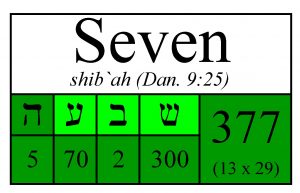 In Daniel 9, the Hebrew word 7 is only used once. That occurrence is found right here in Daniel 9:25 and is specifically related to the timing of the coming Messiah. It is beyond reasonable calculation to claim that it is a coincidence, accident, or happenstance that this single use of the word 7, has as its Hebrew numerical roots, a formula for the Biblical intercalary year of 13 months.
In Daniel 9, the Hebrew word 7 is only used once. That occurrence is found right here in Daniel 9:25 and is specifically related to the timing of the coming Messiah. It is beyond reasonable calculation to claim that it is a coincidence, accident, or happenstance that this single use of the word 7, has as its Hebrew numerical roots, a formula for the Biblical intercalary year of 13 months.
Here is the bottom line. The Divine “word” to restore and build Jerusalem was given in the 2nd year of Darius within a 6 months window of time between the 6th & 11th month. Inside that window of time is a call for the Jewish people to consider or count from 24th day of the 9th month, a date that would someday become the date for the start of the Feast of Dedication, also known as Hanukkah or the Festival of Lights. From that date 7 seventies using a 13 months lunar year gives us 515.02 years. This date likely takes us 5 centuries into the future Festival of Lights in the year 5 BC, a date which 9 months later around the Feast of Tabernacles in 4 BC has great Biblical support as the date of the birth of Yeshua.
Sent Him to Bless You
I ask you now to once again consider the words of the Apostle Peter where he reminds his Jewish brethren about the Oath of Sevens Yahweh made with Abraham. That oath which promised the coming Messiah, a Messiah Peter tells us Yahweh sent to “bless you, in turning away every one of you from your iniquities.”
Ye are the children of the prophets, and of the covenant which God made with our fathers, saying unto Abraham, And in thy seed shall all the kindreds of the earth be blessed. Unto you first God, having raised up his Son Jesus, sent him to bless you, in turning away every one of you from his iniquities. (Acts 3:25-26)
Now also remember the words of Yahweh to the Jewish people given through Haggai which tells them to consider or count from the day the temple’s foundation was laid because Yahweh had promised that from this date He would “bless” them.
18 Consider now from this day and upward, from the four and twentieth day of the ninth month, even from the day that the foundation of YHWH’s temple was laid, consider it…
from this day will I bless you…
And again the word of came unto YHWH Haggai in the four and twentieth day of the month, saying, 21 Speak to Zerubbabel, governor of Judah, saying, I will shake the heavens and the earth; 22 And I will overthrow the throne of kingdoms, and I will destroy the strength of the kingdoms of the heathen; and I will overthrow the chariots, and those that ride in them; and the horses and their riders shall come down, every one by the sword of his brother. 23 In that day, saith YHWH of hosts, will I take thee, O Zerubbabel, my servant, the son of Shealtiel, saith YHWH, and will make thee as a signet: for I have chosen thee, saith YHWH of hosts. (Haggai 2:18-23)
Wonderfully congruent, isn’t it!
The Back Story is the Real Story
So now when you think of Yeshua’s words “I am the light of the world”, words spoken during the Festival of Lights in the final years of His ministry you now know the wonderful back- story to that statement. Indeed, we can say with the apostle John that Yeshua “was the light of men”.
My hope for you, in reading this information, is that it strengthens your faith in the amazing congruency of the Bible’s messianic message and that these two articles shed new light and glory on Yahweh’s redemptive plan for mankind. That message was based in part upon an ancient Oath of Sevens given to Abraham, which promised that through his “seed” all nations of the earth would be blessed. That blessing, (that promised light) which Haggai called us to consider from the 24th day of the 9th month, which Peter reminded us was a blessing which intended to turn mankind away from their iniquities. A light which we can reasonably now claim was made “flesh” during the winter months of 5 BC during the Festival of Lights, then 9 months later that light “Tabernacled” with mankind when Yahweh’s Salvation, Yeshua was born into this world. Now we understand why Yahweh told Haggai that the “glory” of the 2nd temple would be greater than glory of the first.
That glory was Yeshua (Hebrew = Yahweh’s Salvation) come to give light to this world!
Then Jesus said unto them, Yet a little while is the light with you. Walk while ye have the light, lest darkness come upon you: for he that walketh in darkness knoweth not whither he goeth. While ye have light, believe in the light, that ye may be the children of light. (John 12:35-36)
For God, who commanded the light to shine out of darkness, hath shined in our hearts, to give the light of the knowledge of the glory of God in the face of Jesus Christ. (2 Corinthians 4:6)
This then is the message which we have heard of him, and declare unto you, that God is light, and in him is no darkness at all. If we say that we have fellowship with him, and walk in darkness, we lie, and do not the truth: 7 But if we walk in the light, as he is in the light, we have fellowship one with another, and the blood of Jesus Christ his Son cleanseth us from all sin. (1 John 1:5-7)
It is the glory of God to conceal a thing: but the honour of kings is to search out a matter [dabar]. (Proverbs 25:2)
[matter in Hebrew = dabar = word].
Maranatha!
Hanukkah, Christmas, and the Backstory of the Messiah’s Birth – Part I — Here
A Note on Hanukkah and Christmas
I believe the above history provides a reasonable explanation of why the birth of Christ came to be associated with the Roman Catholic celebration of Christmas. In the early first centuries after Yeshua, as the gentile church distanced itself from its Biblical (Jewish) roots, the conception of Yeshua around 25th day of the 9th Biblical month (in nov/dec) easily would have merged with the celebration of the birthday of the Roman god Sol Invictus Mithra on the 25th of December.
For context sake, keep in mind that in the early first centuries of the church there was great animosity between Gentiles and Jews. (Both side bear blame for this schism.) In any event the Biblical celebration of Passover became Easter, the Passover supper became the Lords Supper, the 7th day Sabbath became the Lord’s Day on the 1st day of the week, and Shavout became Pentecost.
A Final Bonus
As a final bonus I leave you with a ribbon of Yahweh’s redemptive plan based in the promise of His coming Glory and strung together with the words of the apostles and prophets who gave them.
The Glory of Yahweh Shall Be Revealed
Comfort ye, comfort ye my people, saith your God. 2 Speak ye comfortably to Jerusalem, and cry unto her, that her warfare is accomplished, that her iniquity is pardoned: for she hath received of YHWH’s hand double for all her sins. The voice [John] of him that crieth in the wilderness [see Luke 3:1-6],
Prepare ye the way of YHWH, make straight in the desert a highway for our God. 4 Every valley shall be exalted, and every mountain and hill shall be made low: and the crooked shall be made straight, and the rough places plain: And the glory of YHWH shall be revealed, and all flesh shall see it together: for the mouth of the LORD hath spoken it. (Isaiah 40:1-5)
The Glory of this House will be Greater
In the seventh month, in the one and twentieth day of the month [final day of the Feast of Tabernacles], came the word of YHWH by the prophet Haggai, saying,
….For thus saith YHWH of hosts; Yet once, it is a little while, and I will shake the heavens, and the earth, and the sea, and the dry land; And I will shake all nations, and the desire of all nations shall come: and I will fill this house with glory, saith YHWH of hosts…
The glory of this latter house shall be greater than of the former, saith YHWH of hosts: and in this place will I give peace, saith YHWH of hosts. (Haggai 2:1-9 excerptd)
The Prince of Peace
For unto us a child is born, unto us a son is given: and the government shall be upon his shoulder: and his name shall be called Wonderful, Counsellor, The mighty God, The everlasting Father, The Prince of Peace. 7 Of the increase of his government and peace there shall be no end, upon the throne of David, and upon his kingdom, to order it, and to establish it with judgment and with justice from henceforth even for ever. The zeal of YHWH of hosts will perform this. (Isaiah 9:6-7)
The Light of the World
In the beginning was the Word, and the Word was with God, and the Word was God. 2 The same was in the beginning with God. All things were made by him; and without him was not any thing made that was made.
In him was life; and the life was the light of men. And the light shineth in darkness; and the darkness comprehended it not.
… 14 And the Word was made flesh, and dwelt among us, (and we beheld his glory, the glory as of the only begotten of the Father,) full of grace and truth. (John 1:1-14 excerpted)
I Have Sworn – An Oath of Sevens
And said, By myself have I sworn [shaba=seven], saith YHWH, for because thou hast done this thing, and hast not withheld thy son, thine only son: 17 That in blessing I will bless thee, and in multiplying I will multiply thy seed as the stars of the heaven, and as the sand which is upon the sea shore; and thy seed shall possess the gate of his enemies; And in thy seed shall all the nations of the earth be blessed; because thou hast obeyed my voice. (Genesis 22:16-18)
That Keeping the Covenant & Mercy (Oath of Sevens)
And I prayed unto YHWH my God, and made my confession, and said, O Lord, the great and dreadful God, keeping the covenant and mercy to them that love him, and to them that keep his commandments; (Daniel 9:4 )
The Blessing of Abraham
14 That the blessing of Abraham might come on the Gentiles through Jesus Christ; that we might receive the promise of the Spirit through faith. Brethren, I speak after the manner of men; Though it be but a man’s covenant, yet if it be confirmed, no man disannulleth, or addeth thereto.
Now to Abraham and his seed were the promises made. He saith not, And to seeds, as of many; but as of one, And to thy seed, which is Christ. And this I say, that the covenant, that was confirmed before of God in Christ, the law, which was four hundred and thirty years after, cannot disannul, that it should make the promise of none effect. For if the inheritance be of the law, it is no more of promise: but God gave it to Abraham by promise. (Galatians 3:14-18)
Consider From This Day Forward – I Will Bless You
Consider now from this day and upward, from the four and twentieth day of the ninth month, even from the day that the foundation of YHWH’s temple was laid, consider it…. from this day will I bless you. (Haggai 2:18-19 excerpted)
Sent Him to Bless You
Ye are the children of the prophets, and of the covenant which God made with our fathers, saying unto Abraham, And in thy seed shall all the kindreds of the earth be blessed. Unto you first God, having raised up his Son Jesus, sent him to bless you, in turning away every one of you from his iniquities. (Acts 3:25 – 4:1)
YHWH sitteth upon the flood; yea, YHWH sitteth King for ever. YHWH will give strength unto his people; YHWH will bless his people with peace. (Psalm 29:10-11)
Lift up your heads, O ye gates; and be ye lift up, ye everlasting doors; and the King of glory shall come in. Who is this King of glory? YHWH strong and mighty, YHWH mighty in battle. Lift up your heads, O ye gates; even lift them up, ye everlasting doors; and the King of glory shall come in. Who is this King of glory? YHWH of hosts, he is the King of glory. Selah. (Psalm 24:7-10)

